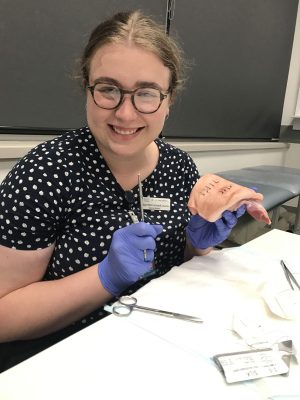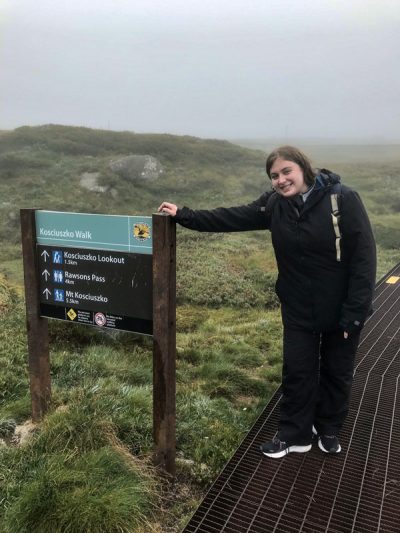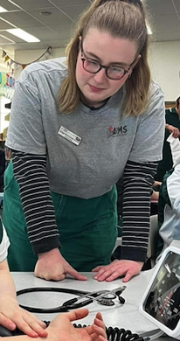As a second-year student in Australian National University’s Doctor of Medicine and Surgery program, Bridget McCormack’s journey into medicine is not just about academic excellence.
It’s about a deep-seated desire to make a tangible difference in people’s lives, particularly in under-served rural communities.
Bridget’s journey into medicine began long before she stepped into the hallowed halls of academia at ANU in Canberra.
“I’ve always had an obsession with learning about the human body, from about the age of five,” Bridget reminisces.
“Human body books were my favourite and I read all the ones we had at home, cover to cover, and over and over.”
Yet, it wasn’t merely a fascination with anatomy that steered Bridget towards medicine; it was also the influence of her childhood GP, a beacon of compassionate care near her small hometown of Jamberoo on the south coast of New South Wales.
“She was regarded as an amazing doctor, and every generation of my family went to her,” Bridget reflects fondly.
“We felt she would always take care of us no matter what was going on with our health and our lives.”
The disparities in healthcare outcomes between rural and urban areas further fuelled Bridget’s determination to pursue a career in medicine.
“When I started my undergraduate degree, I learned that people who live in rural areas have consistently worse health outcomes that people who live in cities, and this further influenced my desire to study medicine,” she said.
“It made me so angry that people who live in places like Jamberoo might have worse health outcomes than people who live in cities, all because of the lack of access to health care and health-promoting lifestyles, both of which aren’t their fault.
“These three aspects came together to drive my pursuit of a career in medicine, and I’m so happy I’ve got this opportunity to have the best career in the world, and hopefully really help some people out with living long and healthy lives.”
Throughout her medical education, Bridget has encountered her fair share of challenges, both academic and personal.
Like many, she has faced moments of uncertainty and fear, such as when she received concerning results from an oral glucose tolerance test during her endocrine block last year.
“I’ve always been really scared of getting diabetes so I was nervous about what my result would be,” she said.
“My fasting blood glucose was 5.9, which isn’t considered pre-diabetic but is on the higher end.
“This thoroughly freaked me out, and I was really worried about being dismissed or being told to simply lose weight and stop eating junk.
“I booked an appointment with a GP who I had been told was good about weight, and in the three weeks I had to wait before I could go to the appointment, I was terrified to eat anything and was avoiding all carbs and sugar.
“I attended my GP appointment, and the GP was great. She told me that we were going to get to the bottom of what was going on, and that whatever was going on was most likely very treatable. I left that appointment feeling a lot better already.”
Bridget completed a repeat oral glucose tolerance test, and the results were shocking.
While her blood sugars were normal, Bridget had significant insulin resistance, which as any medical student studying the endocrine system knows, is devastating news.
“I felt like a failure, and thought that I was on a fast-track to type 2 diabetes,” she said.
“As a medical student surrounded by very health-conscious people all day every day, this was a massive blow for me.”
However, through working with her GP, Bridget was able to understand that the hereditary condition was manageable.
And the part most life-changing for Bridget has been learning that high insulin levels caused by insulin resistance actually significantly increase hunger.
“This meant that in the two-year period where I gained over 20kg, I was actually twice as hungry as everyone else was, which is part of why I always felt so out of control over food,” she said.
“Understanding this was so validating, and since receiving treatment I’ve felt a world of difference and have so much more empathy for my past self who was fighting a losing battle against undiagnosed insulin resistance.”
This experience highlighted to Bridget the life-changing nature of receiving a diagnosis of a chronic condition, particularly such a stigmatised health condition as insulin resistance syndrome.
“It has motivated me even further to train in general practice, where empathy for people with conditions like the one I have is so needed,” she said.
“As someone who has been there, I really feel for all the people who face weight stigma in receiving medical care, and I really want to help these people out in my future.“
It was this experience that solidified Bridget’s resolve to pursue general practice, where empathy and understanding are as vital as medical expertise.
“I want to be part of the different levels of prevention of disease,” she affirms.
“Helping people live healthier lives every day and providing them with realistic goals – that’s what attracts me to general practice.”
When asked about the traits essential for a doctor in general practice, Bridget emphasises the importance of listening, lifelong learning, and non-judgmentalism.
“Listening to patients is paramount,” she said.
“Without understanding their concerns and expectations, we can’t provide the care they need.
“For example, last year I didn’t tell a GP about how I was experiencing plantar fasciitis, because I was scared they were going to tell me it was my fault because my BMI was too high.
“People shouldn’t be afraid that their GP will blame them for their health conditions to the extent that they avoid going to the GP.
“Being non-judgemental is definitely something I think a good GP should be.”
Looking ahead, Bridget envisions herself as a trusted figure in her community – a beacon of hope and healing for those in need.
“In 10 years’ time, I hope to be living somewhere with wide roads and big trees, like Dubbo, Wagga, or Orange,” she muses.
“I want to be someone people know they can trust with anything.”
Throughout her journey, Bridget has found support and inspiration through organisations such as the General Practice Students Network (GPSN).
“The networking opportunities at GPSN have been incredible,” she enthuses.
“Meeting GPs at various stages of training and hearing about their experiences has been invaluable.”
Bridget said a real highlight has been the GPSN x AMSA rural medicine mentoring, where she has been able to talk with a Resident Medical Officer on the GP training pathway for an hour a month one-on-one about her experiences through medical school and in her journey to GP training.
“It was so awesome to hear what it’s actually like in the training pathway that I want to follow,” she said.
“Through GPSN, I’ve been able to step into a leadership role, which has really built up my confidence with leading others – a skill I will definitely continue to use and develop throughout my career.”
Reflecting on her journey to date, Bridget shares a poignant insight into the essence of her calling.
“Something that I’ve reflected on recently is that I’ve been interested in true crime for about six years, and I’ve realised the reason why I like it so much is because I love hearing about the everyday life and struggles of regular people,” she said.
“Through both true crime and history taking in medicine, we get an insight into normal people’s lives,” she explains.
“Understanding that this is why I love history taking so much has really solidified to me that I made the right decision to be a doctor.”







